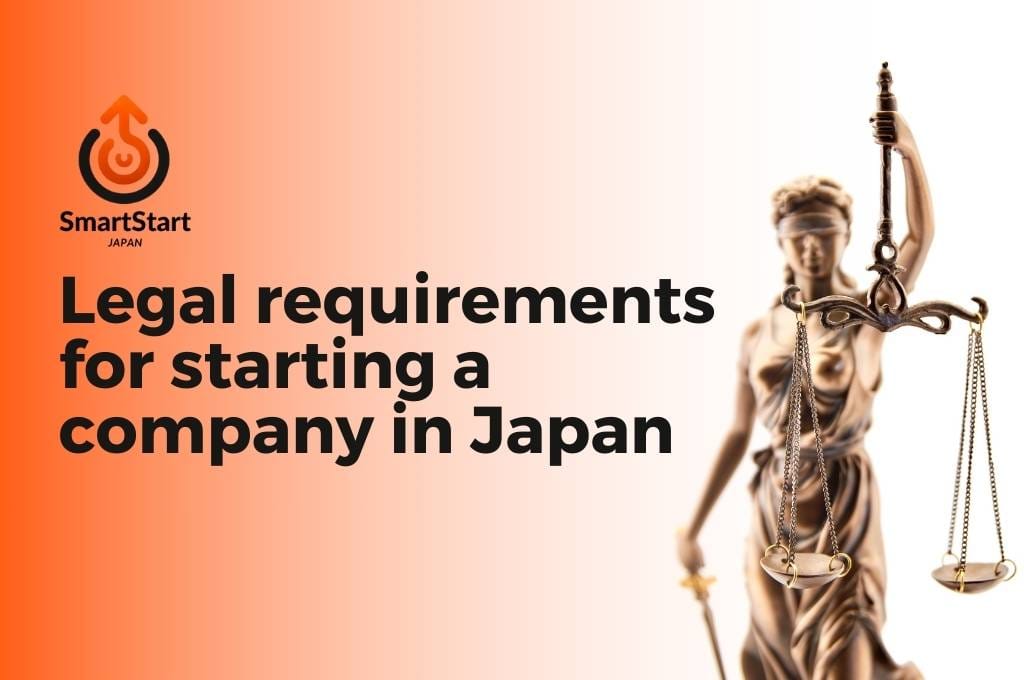Want to start a consulting business in Japan? It’s important for foreign founders to know the whole process, from starting a business and getting the right visa to setting up an office, opening a bank account, and picking a consulting field that works for the Japanese market. This guide will walk you through the specific actions you need to take to launch with clarity, stay compliant, and develop strongly in a unique business atmosphere.
- 6 Documents You Need to Prepare Before Registering Your Consulting company in Japan
- What kind of office space do I need to start a consulting business in Japan?
- How do I officially register my consulting business with the Japanese government?
- 5 Things You Should Know When Applying for the Business Manager Visa
- How do I open a corporate bank account in Japan as a foreigner?
- 3 types of successful consulting businesses in Japan
6 Documents You Need to Prepare Before Registering Your Consulting company in Japan
To register your consulting company in Japan, you’ll need to prepare six key documents. These form the legal foundation of your business and must be correctly formatted, translated, and submitted to the Legal Affairs Bureau.
1. Articles of Incorporation
This document outlines your company’s name, business purpose, capital, and structure. If you are registering a K.K. (Kabushiki Kaisha), it must be notarized by a Japanese notary. A Japanese translation is required if the original is in another language. You can find an example format provided by the Notary Association of Japan here.
2. Company Registration Application Form
This form contains your company’s official information, including its legal address, capital amount, directors, and fiscal year. It must be submitted to the Legal Affairs Bureau. To avoid errors, it’s commonly prepared with professional support. A sample version of this form is available through JETRO’s official guide.
3. Affidavit or Signature Certificate
If you don’t have a Japanese seal certificate (印鑑証明書), you’ll need to submit a notarized affidavit or signature certificate issued by your home country or embassy, along with a Japanese translation. You can view a sample document at this link.
4. Proof of Capital Payment
You’ll need to show that the company’s initial capital has been deposited into a personal bank account before registration. The deposit is usually demonstrated with a passbook copy or a bank-issued certificate.
5. Consent to Act as Director
Each listed director must sign this form to confirm their appointment. It ensures that all officers formally agree to take on their roles.
6. Identification Documents
Submit a copy of your passport and, if applicable, your residence card. Depending on the jurisdiction, a Japanese translation may also be required.
For a visual overview of the full registration process and tips on document preparation, check out How to Register and Set Up Your Business In Japan
What kind of office space do I need to start a consulting business in Japan?
To register your consulting company in Japan, you will need a verified business address. This address must be approved for commercial use and included in your incorporation documents. Common options include a home office, shared or serviced office, coworking space with mail handling, or, in some cases, a virtual office.

Each option must meet the standards set by the local Legal Affairs Bureau for business registration. If you plan to apply for a business manager visa, a physical office space is typically required. The space should be clearly separated from your residence, under a lease agreement, and dedicated to business activities.
If you’re unsure which type of office meets your needs, check out How to Lease Office Space in Japan as a Foreigner for more detail.
How do I officially register my consulting business with the Japanese government?
Step 1: Choose a Legal Entity Type
Select either a Kabushiki Gaisha (K.K.) or a Godo Kaisha (G.K.)
• K.K. is widely recognized and often preferred for B2B consulting
•G.K. offers a simpler setup with lower costs and fewer formalities
Step 2: Decide Key Company Details
Determine the following:
• Company name (confirm it’s not already in use)
• Business purpose and scope
• Capital amount (e.g., ¥5 million if applying for a visa)
• Fiscal year
• Names and roles of shareholders and directors
Step 3: Prepare the Articles of Incorporation
Draft your Articles of Incorporation
• A Japanese notary must notarize your K.K. articles
• A certified Japanese translation is required if the original is in another language
Step 4: Deposit the Capital
Transfer the company’s initial capital into the personal bank account of the representative director.
• Keep a bank certificate or passbook as proof of the transaction.
Step 5: Collect Supporting Documents
Gather all other required documents:
• Company Registration Application Form
• Affidavit/Signature Certificate (for non-residents)
• Consent to Act as Director
• Identification documents (passport, residence card)
Step 6: Submit to the Legal Affairs Bureau
File all documents with the Legal Affairs Bureau in the jurisdiction of your office address
• Registration fee: ¥150,000 for a K.K., ¥60,000 for a G.K.
• Processing typically takes 1–2 weeks
Step 7: Receive Your Company Registration Certificate
Once approved, you’ll receive your company’s Certificate of Registration, which enables you to move forward with banking, tax filings, and visa applications.
Not sure if your documents will meet Japan’s legal standards? Let’s review your setup before you submit. 5 Frequent Questions on Company Establishment in Japan
5 Things You Should Know When Applying for the Business Manager Visa
If you plan to live in Japan while managing your consulting company, the Business Manager Visa is likely the visa category you’ll need. This visa allows foreign entrepreneurs to legally operate and manage a business in Japan, but only if key requirements are met.
1. Your Company Must Be Legally Registered
You’ll need to complete company registration through the Legal Affairs Bureau and obtain your official Certificate of Company Registration. Without this, you cannot begin the visa application process.
2. You Must Have a Physical Office That Meets Immigration Standards
A dedicated, leased office space is required. Virtual offices, coworking desks, or residential addresses without business signage are generally not accepted. Applications without compliant office setups face a high risk of rejection.
3. You Need at Least ¥5 Million in Paid-In Capital
Immigration authorities require proof that this amount was deposited into a Japanese bank account prior to registration. This capital demonstrates your financial readiness to operate a business in Japan.
4. You Must Submit a Japanese-Language Business Plan
Your business plan should outline your services, market strategy, projected finances, and hiring goals. Immigration reviewers will assess the feasibility and seriousness of your business based on this plan.
5. You’ll Need a Complete Set of Supporting Documents
This includes your Articles of Incorporation, company registration certificate, capital deposit proof, office lease agreement, personal ID and resume, and Japanese translations where required. Missing or inconsistent documents are a common reason for delays. If you are uncertain whether your current setup meets the visa requirements, we recommend consulting an expert before applying.
Not sure if your setup will meet Visa standards? Take a look at our visa preparation article, How to Get a Business Manager Visa in Japan , to understand the full process and avoid costly mistakes.
How do I open a corporate bank account in Japan as a foreigner?
Step 1: Register Your Company First
Before applying, you must complete your company registration and receive your Certificate of Company Registration (登記簿謄本). Without this, banks will not consider your application.
Step 2: Prepare Required Documents
Banks typically ask for the following:
• Certificate of Company Registration (登記簿謄本)
• Certificate of Registered Company Seal (印鑑証明書)
• Japanese-language business plan with details on your service, target market, expected transactions, and cash flow
• Office lease agreement to confirm your business has a physical presence
• Proof of company representative’s visa/residency status
• Supporting records like contracts, invoices, or a client list (取引先一覧)
Most banks also require your official company seal set, usually a square seal for legal use, a round seal for banking, and a third seal for invoices. If you’re using a virtual office, your application is at risk of rejection unless the bank is confident in your business’s real activity and legitimacy. Regional and online banks may be more flexible, but even then, a virtual setup must appear credible.
Step 3: Choose a Bank and Submit the Application
Visit the bank branch (some may allow online forms) and submit the application in person. Many major banks still require in-branch appointments. Language support is Language support is often limited, so it’s advisable to bring a Japanese speaker or use a business support service. For reference, some banks like Japan Post Bank, SMBC, or SBI Sumishin Net Bank provide downloadable PDF application forms on their websites.
Still figuring out where to open your account or how to prepare the documents? Watch Guide to a Corporate Bank Account in Japan to learn more about corporate banking in Japan.
3 types of successful consulting businesses in Japan
While Japan’s consulting market is highly competitive, there are clear gaps where foreign entrepreneurs consistently thrive. The most successful areas tend to be those where Japanese companies lack internal global expertise or cross-border perspective. Foreign founders often find strong traction by offering services that bridge cultural, operational, or communication barriers.
Market Expansion and Global Strategy Consulting
Foreign consultants are well-positioned to support Japanese companies aiming to expand internationally. Typical services include outbound strategy development, distributor or partner search, and preparing English-language materials such as pitch decks or proposals. This model is ideal for bilingual founders with previous corporate or international business experience. Those working with larger clients may need to register a formal K.K. or G.K., maintain a physical office, and hold a Business Manager Visa.
Recruitment and Cross-Cultural Communication Consulting
As Japanese companies continue to globalize, many face challenges in managing international hires and multicultural teams. Consultants in this space help with onboarding processes, cross-cultural communication training, and internal HR system design. If you offer hiring or placement services, you are required to obtain a registration license under the Employment Security Act. This field suits former HR professionals, and this model is suitable for bilingual expats and can be scaled through corporate workshops or retainers. A full office setup is optional unless tied to a visa application.
Education and Career Development Consulting
There is growing demand for coaching and training services related to global career readiness, especially among students, job seekers, and junior professionals. Services These services often include business English coaching, resume or interview support, and preparation for studying or working abroad. This model is accessible to solo founders, educators, or certified coaches. Many operate fully online or use hybrid formats. An office is not necessary unless you are applying for a visa, and this model can be highly scaled through digital products like courses or memberships.
Need help validating your business model or navigating legal requirements? Book a 30 mins FREE session with our team
Starting a consulting business in Japan involves a series of clear but detailed steps, from preparing legal documents and selecting the right business structure to securing a visa, setting up an office, and opening a bank account. This guide was created to help foreign founders understand exactly what is required and how to move through each stage without unnecessary delays or confusion.
If you’ve reviewed each section and are ready to take the next step, focus on building a solid foundation that aligns with your goals and meets Japan’s legal and operational standards. With the right preparation, your consulting business can succeed and grow in one of Asia’s most stable and opportunity-rich markets.
Explore more founder tools at SmartStartjapan to help you get started!



